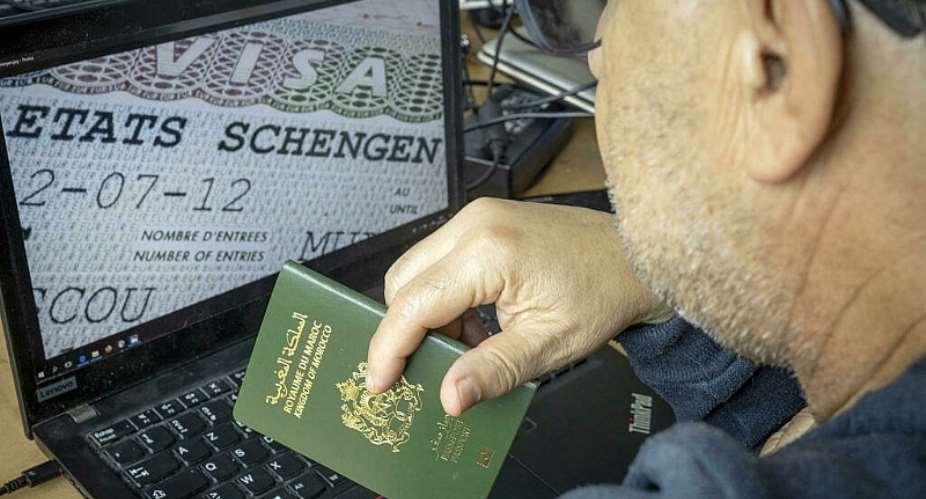France says it will drastically cut the number of visas granted to people from Algeria, Morocco and Tunisia, accusing the former French colonies of not doing enough to allow illegal immigrants to return.
But while the government talks tough on immigration, it is not clear the policy will achieve the desired effect.
Macron has reportedly ordered the number of visa deliveries to Algeria and Morocco to be halved from 2020 levels, and by a third for Tunisia ater diplomatic efforts with the three North African countries failed.
"It's a drastic decision, and unprecedented, but one made necessary by the fact that these countries are refusing to take back nationals who we do not want or cannot keep in France," government spokesman Gabriel Attal told Europe 1 radio on Tuesday.
"There was dialogue, then there were threats, and today we're carrying out those threats," Attal said.
France has been finding it increasingly difficult to send citizens from the three countries back there after they have a received an expulsion order (OQTF).
In effect, when a French court denies a person's visa request, the authorities have to secure a special travel pass from his or her home country in order to forcibly expel them. Paris says Algiers, Rabat and Tunis are refusing to provide that.
'Unjustified' measure
Interior ministry figures show that in the first six months of this year, French courts rejected 7,731 visa requests by Algeria, but failure to get the travel passes meant only 22 individuals were expelled from French territory.
Concerning Morocco, 80 people were expelled (3,301 rejected visa requests) and for Tunisia 131 people were expelled (3,424 rejected visa requests).
"We're hoping that the response will be more cooperation with France so that we can apply our immigration rules," Attal said.
But Morocco's Foreign Minister Nasser Bourita condemned the move as "unjustified", saying his country had carefully dealt with migrant issues to find a balance between allowing freedom of movement while clamping down on illegal migration.
"The decision [by France] is sovereign. Morocco will study it, but the reasons given to justify it require explanation and a dialogue, because they do not reflect reality," Bourita said.
Ineffective?
Some migration specialists questioned whether the visa cuts would achieve the desired results.
Demographer Cris Beauchemin cited a recent study carried out by Oxford University on the impact of restricting visas in 38 countries around the world between 1970 and 2012 .
"It showed that reducing visas reduces illegal immigration but it also reduces the numbers who migrate back to their home countries," Beauchemin told RFI.
When a migrant's visa runs out, they are more likely to stay in France as illegals.
"We also know that restrictions on visas don't stop determined immigrants from migrating. In fact fewer visas probably creates more illegal migrants."
The government is focusing on expelling migrants, Beauchemin said, but "neglects the fact that there is a lot of spontaneous migration back to sub-saharan Africa in particular, and we're not talking much about that.
"A study by the OECD showed that five years after arriving, between 30 and 50 percent of migrants returned home," he added.
Looming elections
Immigration is shaping up to be a key issue in next spring's presidential election, when Emmanuel Macron is widely expected to run and face off against the hard-right leader Marine Le Pen.
The French government announced the visa restrictions on the same day Le Pen presented her National Rally party's programme on immigration.
Macron has said the government will not be "lax" on the issue of immigration.
While three-quarters of visa applications from the three north African countries were granted during the first six months of this year, the overall trend is downwards. 874,309 visas were granted in 2017, 766,575 in 2019.





 Akufo-Addo spotted ordering chiefs to stand for his handshake
Akufo-Addo spotted ordering chiefs to stand for his handshake
 Akufo-Addo ‘disrespects’ every chief in Ghana except Okyenhene — NDC Communicato...
Akufo-Addo ‘disrespects’ every chief in Ghana except Okyenhene — NDC Communicato...
 Supreme Court clears way for dual citizens to hold key public positions
Supreme Court clears way for dual citizens to hold key public positions
 Be transparent, don’t suppress the truth – Prof. Opoku-Agyemang to Jean Mensa
Be transparent, don’t suppress the truth – Prof. Opoku-Agyemang to Jean Mensa
 ‘I won’t tell the world I was only a driver’s mate during challenges’ – Prof Jan...
‘I won’t tell the world I was only a driver’s mate during challenges’ – Prof Jan...
 We’ll prosecute corrupt officials of Akufo-Addo’s govt – Prof Jane Naana
We’ll prosecute corrupt officials of Akufo-Addo’s govt – Prof Jane Naana
 [Full text] Acceptance speech by Prof Jane Naana Opoku-Agyemang as 2024 NDC Runn...
[Full text] Acceptance speech by Prof Jane Naana Opoku-Agyemang as 2024 NDC Runn...
 Election 2024: Don’t be complacent, we haven’t won yet – Asiedu Nketia cautions ...
Election 2024: Don’t be complacent, we haven’t won yet – Asiedu Nketia cautions ...
 Election 2024: Stop fighting over positions in Mahama’s next govt – Asiedu Nketi...
Election 2024: Stop fighting over positions in Mahama’s next govt – Asiedu Nketi...
 Prof Jane Naana Opoku-Agyemang will restore dignity of vice presidency – Fifi Kw...
Prof Jane Naana Opoku-Agyemang will restore dignity of vice presidency – Fifi Kw...
